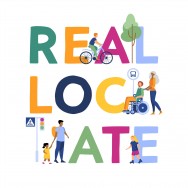- Home
- International relations and projects
- Two Days of European Exchange with the REALLOCATE Project
Documenti
Two Days of European Exchange with the REALLOCATE Project
Bologna recently hosted an inspiring two-day Twinning Visit as part of the
European REALLOCATE project, focused on the sustainable and inclusive
transformation of urban spaces. In
addition to the delegation from Barcelona, the initiative welcomed key international
partners such as Nudgd, the International Federation of Pedestrians, FACTUAL,
DEKRA Automobil, the Barcelona Supercomputing Center, the European Cyclists'
Federation, and Ajuntament de Barcelona, all hosted by the Municipality of
Bologna.
The shared goal of the visit was to rethink the city as a public space that is accessible, inclusive, and environmentally friendly. Kicking off the event was Anna Lisa Boni, Bologna’s Councillor for International Relations and Cooperation, who emphasized the importance of an integrated approach to urban planning—a vision that links mobility, energy, and culture as fundamental levers for the regeneration of European cities.
On the first day, municipal representatives presented some of the city’s most impactful strategies for improving urban mobility. Among them was the reduction of speed limits from 50 to 30 km/h, a measure already showing positive results in terms of road safety. Other green projects were also showcased, including the bike-sharing system and various sustainable mobility solutions, with a particular focus on collaboration between the public sector, private stakeholders, and active citizens.
Two parallel sessions then explored key topics: the planning of alternative transport systems and behavioral change in daily mobility choices. Both sessions highlighted the importance of co-design and public participation in effectively and inclusively addressing urban mobility challenges.
The visit continued with site visits to two "school plazas": Via Procaccini and Via di Vincenzo. Once used for car parking, these areas have been transformed into pedestrian-friendly community spaces. These interventions, backed by solid data and strong local engagement, serve as replicable models of participatory urban regeneration.
On the second day, partners engaged in hands-on field experiences at the pilot site in Parco Grosso. Here, participants took part in a walkability audit led by the International Federation of Pedestrians, a cycling safety assessment guided by FACTUAL and the European Cyclists' Federation using the Lane Patrol tool, and a technical demonstration on urban traffic conducted by DEKRA Automobil and the Barcelona Supercomputing Center, illustrating how data can be translated into concrete solutions for safer streets.
With a positive closing and praise from the international partners, the Twinning Visit reaffirmed Bologna’s position as a European leader in sustainable mobility and urban innovation.
Ultimo aggiornamento: mercoledì 23 aprile 2025






